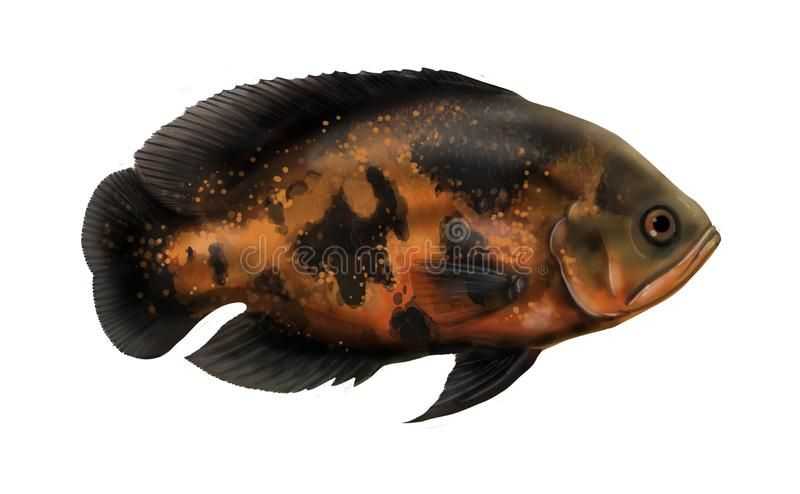Oscar

Species Details
Astronotus Ocellatus
Cichlidae
Perciformes
onshore, estuaries, bays, rivers
1 - 3 lbs.
10" - 14"
Oscar (Astronotus ocellatus) Fish Description
The Oscar (Astronotus Ocellatus) is a freshwater fish of the cichlid family. It is a large predatory fish that is known for its aggressiveness, huge appetites, and territorial behavior. It preys mainly on small fishes, crayfish, worms, insect larvae, and mollusks, although it is also known to eat some small vertebrates. There are several varieties of fish but all of them look pretty much the same with their oval-shaped bodies and fan-shaped caudal fins. The difference in varieties is mainly attributed to their different colorations and markings. Oscar varieties include:
- Tiger – has a mostly black body with orange stripes
- Green – has a mossy green shade with some yellow or black markings
- Red – has a red to bright orange coloration with some blotches of black
- Blue – has a light to dark blue body color with some yellow or orange markings
- Black – has a black body with some blotches that are sometimes red/orange, or sometimes yellow or even gray.
- White – has a white color with orange or yellow markings
- Albino – has a white-pinkish tone with smaller (as compared to the white variety) orange or yellow markings
Interesting Facts
- In captivity, Oscars can grow as much as eighteen inches in length and three and a half pounds in weight.
- There are some records of an Oscar fish growing to as much as twenty-two inches in the wild.
- They can live up to thirteen years in the wild and up to twenty years in aquariums.
- It is said that they are one of the most intelligent fish as they can be taught to do tricks.
- They have strong teeth located at the back of their throats that help to prevent their prey from escaping.
- Much like possums, Oscars can play dead by lying on their side when they feel threatened.
- The markings on their body help them camouflage in their environment.
- Oscars are known to care for their eggs and young until they are big enough to fend for themselves.
- Due to their aggressive and territorial nature, Oscars can’t be put together with other species in an aquarium.
- Though they mostly prefer small fishes, insects, and small crustaceans for nourishment, they are sometimes fed veggies and fruits in captivity.
- Oscars need vitamin C to survive.
- Oscars are also fished for their tasty chunky meat.
Size and Swimming Speed
Although there were some records of this fish growing as much as twenty-two inches in the wild, average sizes tend to be just somewhere between ten to twelve inches long. They also tend to swim a bit slow in their natural habitats but can dash fast at short distances when threatened.
Habitat and Distribution
In the US, Oscars are abundant in southeast Florida, particularly in the everglades, western Miami-Dade, Broward, and Palm Beach counties where it’s become a popular gamefish among fishing enthusiasts. Oscars also prefer warm waters much like where they originally come from. They are also likely to be found in canals, river systems, lakes, ponds, and marsh habitats where they usually swim rather sluggishly at the bottom.
Although this fish is originally from the Amazon River basin in South America, it can now be found in some river systems in the US, Australia, and several Asian countries including India and China. The reason why this Amazonian fish can now be found in many countries is that:
1) it was introduced to become a gamefish for sport fishers, and
2) it is a popular ornamental fish kept in private aquariums where many owners opting to release the fish in the wild when the fish has either become too big for their aquariums or when the fish has become too bothersome to care for.
Unfortunately, with the proliferation of this fish species in many river systems, it has become a pest in some parts of the world. Due to Oscar’s ability to adapt well to different environments, their huge appetites, and their overly territorial behavior, they have become an invasive species, wreaking havoc in different ecological systems.
Fishing Techniques - How to Catch Oscar
You can pretty much use any bait as it’s not a particularly picky eater. However, anglers who have been successful in catching a lot of these typically use crickets and worms as bait. You can also opt for fish or shrimp cut into little pieces. Lastly, Oscars are known to be ferocious fighters when hooked. If you want a bit of a challenge, you can use a light spinning tackle or a fly rod.







